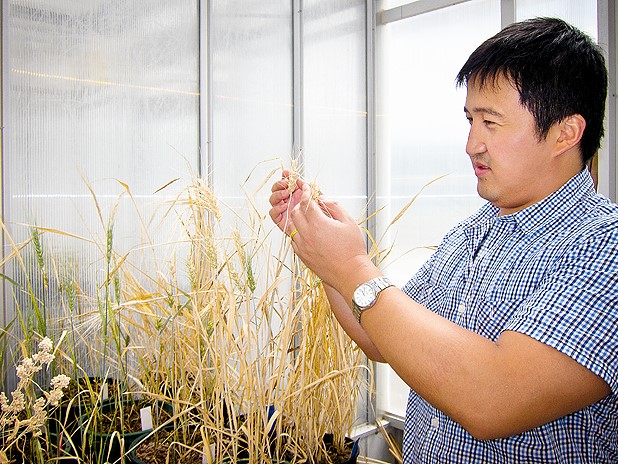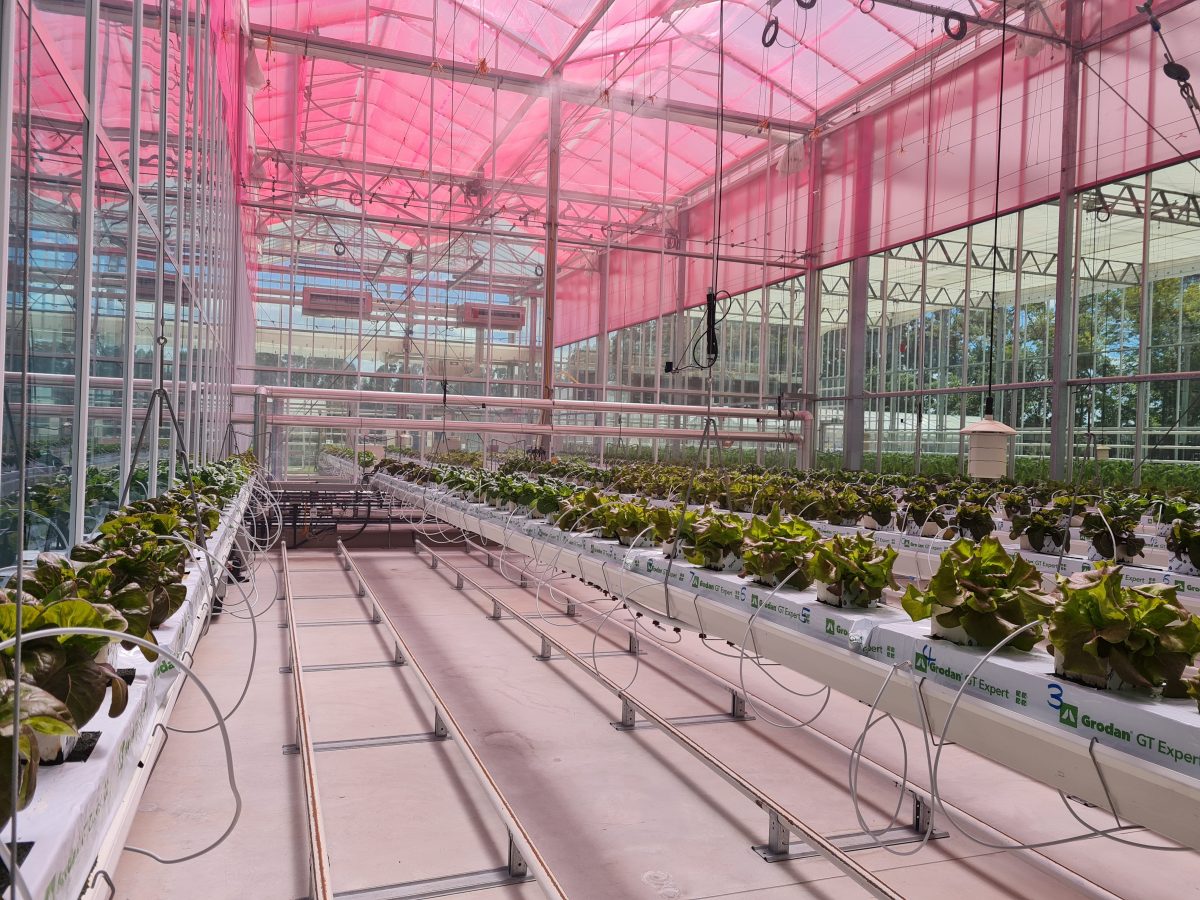Western Sydney University’s Professor Zhonghua Chen – research lead on the ‘Optimum cooling strategies for vegetable protected cropping in warm climates’ project, working with PhD student Terry Lin and CRC supporting participant Qatar University – is an expert in plant physiology, plant breeding, biophysics and agronomy. A globally recognised, highly cited researcher and the recipient of numerous prestigious research grants and award, he brings significant expertise to the role.
Global recognition for research excellence
Prof. Chen has spent more than 20 years exploring plant physiology and the biotechnology of food crops. His internationally recognised track record of research excellence in agriculture, plant science and evolutionary biology is evidenced by more than 160 publications, an h-index of 45, and 7,500-plus citations since 2005. He is the Editor in Chief of Plant Growth Regulation and a reviewer for more than 80 international journals. He also serves as international referee for grant applications to the Deutsche Forschungsgemeinschaft, Netherland Organization for Scientific Research, Swiss National Science Foundation, Natural Science Foundation of China, South Africa National Research Foundation and others.
He has been the recipient of research grants from the Australian Research Council (ARC), Hort Innovation, Cotton Research and Development Corporation (CRDC), Grains Research and Development Corporation (GRDC) and Australia-India Strategic Research Fund (AISRF), and has netted several research awards.
In 2017, he completed an Australian Research Council (ARC) Discovery Early Career Research Award (DECRA) fellowship, and currently, he is an ARC Future Fellow (2021-2025). He was the recipient of the 2013 Australian Government Minister for Agriculture, Fisheries and Forestry Award.
Early career: From China to the world
Chen’s academic career began in China, where he completed a Bachelor of Agriculture in 2002, followed by a Masters in 2003, both at Zhejiang University.
“In 2005, I was fortunate enough to receive an International Postgraduate Research Scholarship to the University of Tasmania to work on my PhD project, which was on the genetics and physiology of salinity tolerance in barley – one of the top Australian exporting agricultural commodities,” he recalls. “I then worked on a postdoc project from 2008 to 2011, on the modelling of stomatal guard cells of the model plant Arabidopsis and a horticultural crop, broad bean, at Glasgow University in the UK.
Returning to Australia in 2011, Dr Chen joined the School of Natural Sciences at Western Sydney University as a Research Lecturer in Greenhouse Horticulture. In the ensuing 11 years, he’s risen through the ranks to become an internationally recognised researcher and academic leader.

Professor Chen inspecting a wheat crop in a greenhouse: “My field of research is evolving rapidly with the advances in molecular biology and genomics for both field and greenhouse crops, and technological innovations in protected cropping,” he says. Credit: David Wong
Research foci: plant resilience traits and PC productivity
Prof. Chen’s research interests lie in three main areas:
- stomatal regulation in the drought- and salinity-tolerant wild relatives of barley, wheat and rice;
- molecular evolution and comparative genomics for abiotic stress tolerance in angiosperms and ferns; and
- improving horticultural crop production and quality in high-tech greenhouse facilities.
“My field of research is evolving rapidly with the advances in molecular biology and genomics for both field and greenhouse crops, and technological innovations in protected cropping,” Prof. Chen says. “Globally, one of the major challenges in agriculture and horticulture is the yield loss caused by abiotic stresses such as drought and salinity.
“For protected cropping, the key challenges are the high cost of labour, energy and pest management, all of which hamper sustainable production of nutritious vegetables and medicinal crops.
“To address these questions, we have worked closely with universities and industry partners to conduct high-quality research work and solve real-world problems for the agricultural sectors.”

A recent CRC project at WSU, with CRC industry partners Hort Innovation, LLEAF Pty Ltd and Rjik Zwaan, is comparing the performance of two prototype light-diffusing films – LLEAF-Red and Smart Glass ULR-80 – with that of conventional glass. Credit: LLEAF Pty Ltd
Collaborative PC trials: Smart glass, crop productivity and cooling strategies
It is in the area of protected cropping that Professor Chen’s knowledge and expertise have proven most valuable to his collaborators, including the CRC.
“At Western Sydney University, we have a large range of crop research facilities, such as our high-tech greenhouse, and indoor growth rooms with highly accurate climate control. We have also established strong collaborations with some of our research partners,” he says.
“A good example of excellent research collaboration is our joint work on ‘smart glass’ prototypes [initially, Smart Glass (SG) ULR-80 and more recently, LLEAF-Red light-spectra-altering agricultural films] to reduce energy use and increase crop productivity in high-tech protected cropping facilities.”
Prof. Chen and his colleagues’ work with SG ULR-80 and LLEAF-Red is part of an ongoing collaboration involving WSU, Swinburne University of Technology, CSIRO, Syngenta, LLEAF Pty Ltd and Rjik Zwaan, with funding from Hort Innovation and, most recently, from Future Food Systems CRC.
“From 2018 to 2022, we were able to run nine experimental trials in four glasshouse chambers on two eggplant crops, two capsicum crops (growing two varieties), three lettuce crops (growing three varieties) and two cucumber crops (using two cultivars) under standard greenhouse diffused glass, Smart Glass and LLEAF film.”
“The research team has published some high-quality research papers in top academic journals such as Energy, Journal of Experimental Botany and Food and Energy Security,” Prof. Chen says. “The long-term crop trials also provided a wealth of useful data of crop physiology, yield and quality, as well as greenhouse climate data for energy analysis, which is available for Australian vegetable growers.”
Since July 2021, Prof. Chen has also been the project lead on the CRC’s ‘Optimum cooling strategies for protected cropping of cucumber in warm climates’ project.
“High cooling energy use is a big challenge in the application and promotion of protected cropping in warm climates,” he explains. “One of the solutions is the development of new cooling technologies and their application in greenhouses.”
“The aim of the project is to identify greenhouse cooling strategies for cucumber in warm climates through experimental work and systems modelling approaches. We are in the process of collecting data from the cucumber experimental trial to feed into a greenhouse cooling model.”
“The outcome of the project will benefit the protected cropping industry by providing a set of greenhouse cooling strategies that are potentially useful, enabling growers to expand their production of high-yield, high-quality greenhouse cucumbers in warm-climate areas across Australia,” he says.
When he’s not in the greenhouse, you’ll often find Zhonghua Chen tending to his own collection of plants, outdoors and under cover.
“One of my hobbies is gardening,” he says. “I’m growing some unique and beautiful plant species – ferns, gymnosperms, angiosperms – in my backyard and in the house.”
Getting outdoors also means kicking a ball around, says Chen, who confesses he enjoys playing the occasional game of extracurricular soccer at WSU’s Hawkesbury Campus.
Lead image: Professor Zhonghua Chen. Credit: Western Sydney University.


